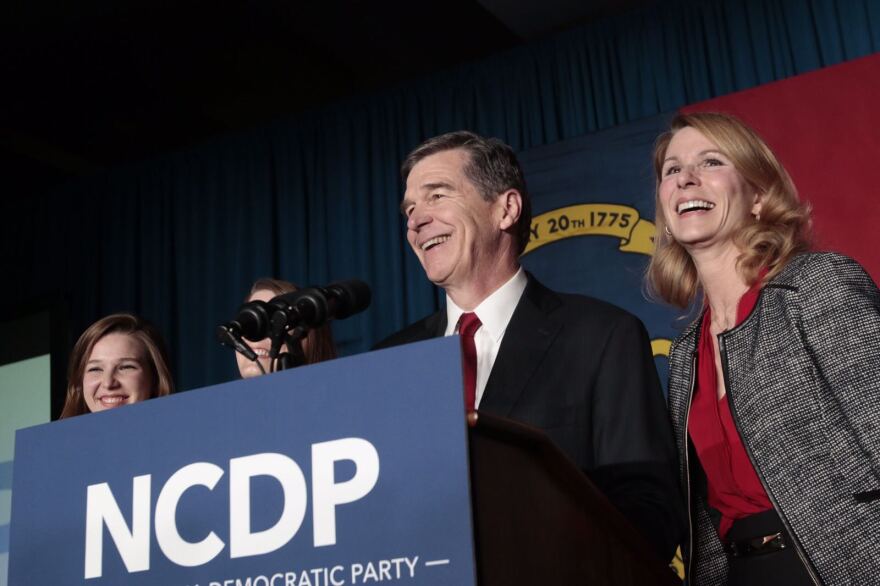One year ago, House Bill 2 moved through the General Assembly and was signed into law by Governor Pat McCrory. A frenzied political day amplified partisan bickering, triggered unintended consequences, and established a divisive law that remains on the books.
The so-called bathroom bill served as a key political issue in North Carolina last year. It ignited conservatives and progressives, became a regular topic on the campaign trail, and drew attention from around the world – all while reflecting what was happening on a national level.
A State Divided: HB2 & Transgender Rights - A Special Report
This time last year, a political firebrand was barreling through the Republican presidential primary, on a crash course with American history. Donald Trump eliminated GOP opponents one by one. And while some in the party feared potential down-ballot effects, the candidate invigorated millions.
“I think that sort of populism, the sort of rural anger, definitely fueled HB2’s rise and I think continued support,” said David McLennan, political science professor at Meredith College in Raleigh, adding that House Bill 2 arrived at a moment in American politics when divisions between conservative and liberal voters ran deep.

“The timing of it was perfect because of the timing of Trump, and the issue was one they could latch onto as more of a symbol of this sort of progressive humanism that, in their mind, has been changing North Carolina for 30 years,” McLennan said.
HB2 is a microcosm of a larger national movement: rural voters seeking a candidate or issue that bucks liberal agendas and big city politics. There were large, loud, passionate rallies for – and against Trump – and the bathroom bill, including from the Raging Grannies. The group gathered in downtown Raleigh in opposition to HB2 last spring.
It is bad behavior for a man to have access to the restrooms, dressing rooms, locker rooms, or any place that women go in private to change and to undress. - Pastor Patrick Wooden
“Government overreach surely must be, when they start making laws about where we can pee,” the group sang. “So it’s Monday in Raleigh and we’re back today, to tell Pat McCrory that we’re here to stay.”
A few weeks later, a group of pastors rallied in support of the law, just a few blocks away. Pastor Patrick Wooden talked to the crowd.
“It is bad behavior for a man to have access to the restrooms, dressing rooms, locker rooms, or any place that women go in private to change and to undress,” Wooden said.

These were dozens of rallies across the state. One side framed bathroom access as a civil rights issue. The opposition contended it was about protecting women and girls from predators entering bathrooms - although there was no credible evidence to substantiate this as a public safety issue.
HB2 And NC's Gubernatorial Race
As election season crescendoed, candidates sounded off on HB2 during speeches, on Twitter, and in campaign ads. Despite an improving economy and lower tax rates, then-Governor Pat McCrory made the bathroom issue central to his re-election bid.
“I’ve been looking for a compromise for months on this issue,” McCrory said to his gubernatorial challenger Roy Cooper during a debate last year. “But I’ll make a deal with you right now – if you agree to take out this gender identity and gender expression with regarding access to our school's restrooms, locker rooms and showers – I will support in a bipartisan effort to make sure we do not discriminate against the LGBT effort in hiring or firing.”
Governor McCrory continues to go across the state, telling people that this is not hurting our economy...Governor, what planet are you on? - Roy Cooper, during gubernatorial campaign
McCrory blamed the press, high-profile celebrities, outside progressive groups, and the Obama administration whenever he could.
And at every turn, Cooper – the democratic attorney general who refused to defend the bathroom bill in court – took aim at his opponent.
“Governor McCrory continues to go across the state, telling people that this is not hurting our economy,” Cooper said. “He attacks businesses who are opposed to it and says that everything is going fine. Governor, what planet are you on?””

Cooper won a very close race, unseating McCrory by less than 11,000 votes. And while it might be tempting to call McCrory’s loss a casualty of House Bill 2, that isn’t fair. After all, Republican Lieutenant Governor Dan Forest won comfortably – touting HB2’s safety issue all the way to his victory speech. McCrory lost voters in urban areas, and he never made strong Republican allies at the legislature during his years in office.
Governor Cooper continues to lead the calls for a repeal of HB2, but Senate Leader Phil Berger holds the high card. He presides over a Republican veto-proof majority and is the most powerful politician in the state.
“I don’t think straight repeal is going to occur,” Berger said earlier this year. “I think it s a very difficult thing for that to be accomplished and I don’t know if it satisfies the concerns people have.”
If any fundamental changes to HB2 do take place in the legislature, bipartisan compromise is needed. Lawmakers aren’t there yet. And even if a deal is brokered – and implemented – House Bill 2 will likely remain on North Carolina’s political stage for years to come.







